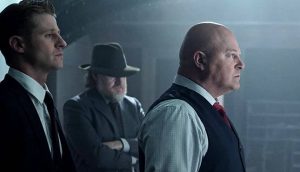
Gotham 2.4: “Strike Force”
With the latest episode of Gotham, the creators have pulled out one of their best cards and slammed it on the table and have told viewers “read it and weep.” But there’s more to playing a good game of poker than just having the best card.
Their best card – at least in the minds of many viewers – is the Penguin, and he has done so little this season. Now that we come to the fourth episode, the producers decided to use him at last, and it feels forced. As you recall, Penguin obtained his status as the king of the underworld by the end of last season; once you get to the top, there’s really nowhere else to go.
Yes, yes, he served an interesting role a couple of episodes ago where he and Gordon exchanged favors, but that was really more about Gordon and the line he was willing to walk. There’s been no arc for the Penguin at all.
So, they kind of forced it here: the “plotting” bad guy -Theo Galavan – calls the Penguin in to do his dirty work. He even tells the Penguin of his evil plan, showing him one of those miniature cities of Gotham that all villains have when they want to show how they are going to change things once they take over. Galavan wants to be mayor, so, in a plot that any twelve-year-old could come up with, he hires (uh, no, blackmails) the Penguin to kill the other candidates. Remember when they shoehorned in that otherwise irrelevant scene in an earlier episode of the season, where they showed that Galavan had the mayor kidnapped? Yeah, you do.
Yes, the Penguin must also have his boys attempt to kill Galavan himself, so it all looks convincing. Penguin doesn’t want to do it, but you remember I mentioned that he was going to be blackmailed, not hired. Yes, you guessed it: Galavan has kidnapped the Penguin’s mother (Carol Kane, returning from last season). So the Penguin does it.

This is a cookie-cutter plotting at it’s worst. The Penguin and was able to climb his personal ladder in the first season by being ruthless, cunning and observing when an opportunity presented itself. When all that failed, he might have gotten lucky from time to time. When that failed, he wasn’t afraid to beg for mercy, because people tend to dismiss him anyway. Often, just squeaking by with his skin intact would be enough of a victory for him, and he’d make the most of it with his other skills later on. As a result, seeing him rise to the king of the underworld was something that the viewer could watch unfold in ways that were consistent with his character.
Now his character has be reduced to a more paper-thin version of itself, as a simple kidnapping has gotten him involved in a plot that’s even more paper thin, and would otherwise have nothing to do with him anyway.
The blackmail works. The Penguin kills the other candidates. There’s even a purposefully botched drive-by shooting of Galavan himself when the man is accepting an award or something – and all the shots miss, and Galavan, having survived, declares his candidacy right then and there.

The only time the Penguin’s story becomes interesting here – save for the end when it seems that Galavan had his mother (I think) killed anyway (though I could be reading that final scene all wrong) – is when it crosses with Gordon’s story.
Gordon’s story is also a cookie-cutter affair: a big, bold and brash new captain comes into the department, fires a lot of the cops (because if they are corrupt and at all potentially interesting, they are out) and anoints Gordon as his second, and together they recruit a new force of cops right from the academy, young people who haven’t yet been corrupted. Hi sweetie, you shine up like a new penny!
It’s funny how these two cookie-cutter story-lines each only become interesting when they blend together, like one of those Venn diagrams.
Gordon’s new strike team is of course, on the case of the dead candidates, and when they come upon the scene of one of these crimes, Gordon recognizes Victor Zsasz, which tips Gordon off to the fact that Penguin is involved just ahead of when the witnesses spill the beans. And the interesting scene comes when Gordon sees the Penguin about what is happening in private. It’s interesting because the new police captain has bumped Gordon up the ranks and fired corrupt cops, but the Penguin knows that Gordon killed someone to collect a debt for him, and by bringing in the Penguin, Gordon risks having that little incident being exposed.
There you have it. That’s really the most interesting thing about this episode; that small spot where black and white meet and become gray.
Of course, the other most interesting bit in this episode involves a quick line by a very sidelined Bullock. Bullock doesn’t like the new captain, and he tells Gordon as much. The new captain is idealistic and straightforward, and Bullock reminds Gordon that Gotham is a like a river with twists and turns. That’s how it will always be. Bullock’s remark literally saves this episode for me and keeps it afloat. It has me hopeful that the producers haven’t forgotten what kinds of stories this series has been telling from the beginning.

There’s a new film called The Walk, in which recounts a man’s dangerous tightrope walk across the Twin Towers way back when. I haven’t seen it, but I’m sure the man falters at least once during the walk. Gotham’s producers have also been balancing a pretty thin tightrope since the show’s inception. They have hard-boiled and cliched cop procedural stuff, balanced with a few characters whom we care about and are forced to make really tough choices, all set in a gritty world that occasionally embraces a wild overly comic cook type of feel. More to the point, the producers were able to use these rather disparate elements to satirize modern serialized storytelling, and somehow they’ve been subtle enough about it that viewers could get invested into these convoluted story-lines without even realizing that it was all a satire. It was the producers and creators of this show, then, who would have the last laugh (to take the title of the previous episode) when they’d look at who’s still watching this thing week after week and they’d sit back in satisfaction, having lured them in. The insidious nature of satire works when it convinces it audience that it isn’t satire.
Yet: Are the producers, like the guy on that rope, starting to lose their footing now?
The answer is: it’s hard to say. Truth be told, most of the memorable episodes have sprung from shallower origins than a bad guy blackmailing another bad guy. Remember that “Red Hood” episode from the first season which starts with a guard unloading his entire gun on a criminal and missing with every shot? If you recall, that was actually a really good episode.
With Gotham, the stories are all bit cliche, at least at their core, so it’s hard to be critical of “Strike Force” for being guilty of those same things. However, it certainly wasn’t a very strong showing, despite crisp direction and decent performances.
Though: how can I even rate this? It concludes with Gordon’s new team given the task of bringing down the Penguin. How the conclusion of this hunt will come to affect Gordon will really be the determining factor if this episode worked at all, and we’ll have to wait till next time.
I have to stress the fact that this could all work: the producers could really make both Gordon’s and Penguin’s story pay off in the next installment. These guys are unlikely allies, so maybe they can team up in a way no one could foresee and turn the tables on both the evil Galavan and the awfully too squeaky clean captain.
One final note: I’ve been patient for the last half dozen or so episodes with the whole Riddler story-line. That patience has ended. To quote Forrest Gump: “And that’s all I have to say about that.”
My rating: 2.8/5










